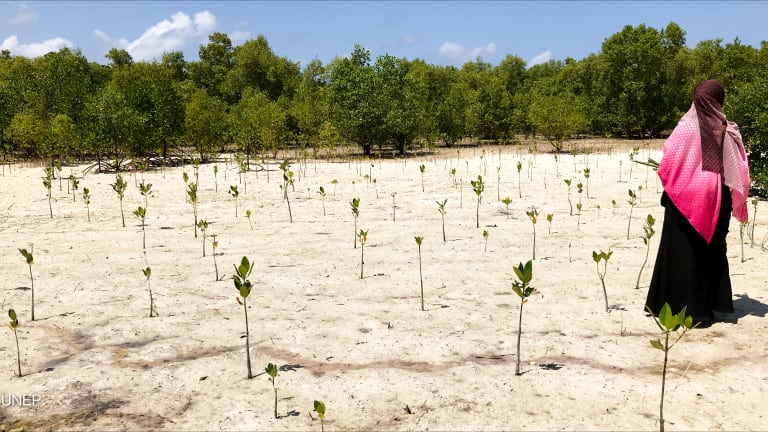How FCDO plans to spend £2 billion in contracts
Our analysis shows that 56.3% of the estimated budget will go to development-related contracts.
The United Kingdom was an aid powerhouse in the previous decade, but its influence in the global development sphere has diminished in the last four years, following a government decision to reduce aid spending. A recent report warns about another potential cut, where the effective aid budget – money spent abroad — could dip down further to 0.36% of gross national income — the lowest in 17 years. Last month, the U.K.’s lead aid agency, the Foreign, Commonwealth & Development Office, published its second commercial pipeline of the year, providing a look into its future priorities and planned procurements. The report included 72 opportunities, with a total estimated contract value of £1.96 billion — 11.5% less than the total forecasted allocation for the same month in the previous year and 21.9% less than the pipeline published early this year. So what did we find out from the latest pipeline? The top-level figures The forecast contained 58 new contracts, worth £1.1 billion. Another 12 contracts, worth £691.9 million, are re-procurement with the same scope as the last commercial pipeline, while two contracts, worth £136 million, are re-procurement with a different scope. Based on the report, FCDO is expected to release 33 tenders, worth £744.2 million, as early as the last quarter of the 2024 calendar year. Another 14 tenders, worth £672 million, will be released in the first quarter of 2025. The rest will be advertised from the second quarter of 2025 to as late as the second quarter of 2029. FCDO does not differentiate development-related activities from procurements that will support its operations and programs, so we reviewed each contract to identify which are development-focused. We also identified their place of performance and target sectors. Based on our analysis, FCDO earmarked 56.3% of the total budget, worth £1.1 billion, for development-related opportunities. <div class='tableauPlaceholder' id='viz1731042810818' style='position: relative'><noscript><a href='#'><img alt='FCDO priorities ' src='https://public.tableau.com/static/images/FC/FCDOcommercialpipelineOctober2024/FCDOpriorities/1_rss.png' style='border: none' /></a></noscript><object class='tableauViz' style='display:none;'><param name='host_url' value='https%3A%2F%2Fpublic.tableau.com%2F' /> <param name='embed_code_version' value='3' /> <param name='site_root' value='' /><param name='name' value='FCDOcommercialpipelineOctober2024/FCDOpriorities' /><param name='tabs' value='no' /><param name='toolbar' value='yes' /><param name='static_image' value='https://public.tableau.com/static/images/FC/FCDOcommercialpipelineOctober2024/FCDOpriorities/1.png' /> <param name='animate_transition' value='yes' /><param name='display_static_image' value='yes' /><param name='display_spinner' value='yes' /><param name='display_overlay' value='yes' /><param name='display_count' value='yes' /><param name='language' value='en-US' /><param name='filter' value='publish=yes' /><param name='showShareOptions' value='false' /></object></div> <script type='text/javascript'> var divElement = document.getElementById('viz1731042810818'); var vizElement = divElement.getElementsByTagName('object')[0]; if ( divElement.offsetWidth > 800 ) { vizElement.style.width='580px';vizElement.style.height='1227px';} else if ( divElement.offsetWidth > 500 ) { vizElement.style.width='580px';vizElement.style.height='1227px';} else { vizElement.style.width='100%';vizElement.style.height='1477px';} var scriptElement = document.createElement('script'); scriptElement.src = 'https://public.tableau.com/javascripts/api/viz_v1.js'; vizElement.parentNode.insertBefore(scriptElement, vizElement); </script> <i style=font-style: georgia;”>FCDO priorities, based on its October 2024 commercial pipeline.</i> Where is the money being spent? Around 67.1% of the total budget for development, worth £739.6 million, has unspecified recipient countries. Based on our analyses of the previous forecasts, this will likely go to multicountry, regional, or global initiatives. In total, we identified 12 recipient countries. Among them, the biggest amount will be spent in the Democratic Republic of Congo, worth £92.8 million for four contracts. This included £65 million to address the issues of deforestation in the Congo Basin, £20.8 million to support SMEs in the agriculture sector, and £7 million for two contracts on monitoring and evaluation, or MEL, of the Green Growth Programme. Zambia ranked next, with £78 million for four contracts: £38 million to support democratic institutions and practices, £27 million for climate resilience, £10 million for poverty reduction, and £3 million for the MEL component of the climate resilience project. South Sudan also received a sizable budget, worth £59.2 million, to support the education sector in the country. Which sectors will receive the most cash? Just three sectors accounted for two-thirds of the development budget. Humanitarian and emergency response got the largest share, worth £266.5 million. This will be spent on two contracts: £264 million for the Humanitarian Emergency Response Operations and Stabilisation, or HEROS, 2.0 — FCDO’s global initiative for humanitarian and emergency response — and the remaining £2.5 million to support the integration of Syrian refugees in Turkey. Another £252.8 million is allocated for three contracts on green development, with the largest share, worth £230 million, for the establishment of the Green and Inclusive Growth Centre of Expertise. The center will focus on inclusive and sustainable poverty reduction and green economy. The remaining two contracts will be implemented in DRC, which were already mentioned in the previous section. Climate and the environment ranked next among priority sectors, with £218.6 million for 10 opportunities. Among these is a £65 million contract for the implementation of FCDO’s multicountry Forest Governance, Markets and Climate. Try out Devex Pro Funding today with a free five-day trial, and explore funding opportunities from over 850 sources in addition to our analysis and news content.
The United Kingdom was an aid powerhouse in the previous decade, but its influence in the global development sphere has diminished in the last four years, following a government decision to reduce aid spending.
A recent report warns about another potential cut, where the effective aid budget – money spent abroad — could dip down further to 0.36% of gross national income — the lowest in 17 years.
Last month, the U.K.’s lead aid agency, the Foreign, Commonwealth & Development Office, published its second commercial pipeline of the year, providing a look into its future priorities and planned procurements.
This story is forDevex Promembers
Unlock this story now with a 15-day free trial of Devex Pro.
With a Devex Pro subscription you'll get access to deeper analysis and exclusive insights from our reporters and analysts.
Start my free trialRequest a group subscription Printing articles to share with others is a breach of our terms and conditions and copyright policy. Please use the sharing options on the left side of the article. Devex Pro members may share up to 10 articles per month using the Pro share tool ( ).
Miguel Tamonan is a Senior Development Analyst at Devex, where he analyzes data from public and private donors to produce content and special reports for Pro and Pro Funding readers. He has a bachelor’s degree in Political Science with a Major in International Relations from the Polytechnic University of the Philippines.








